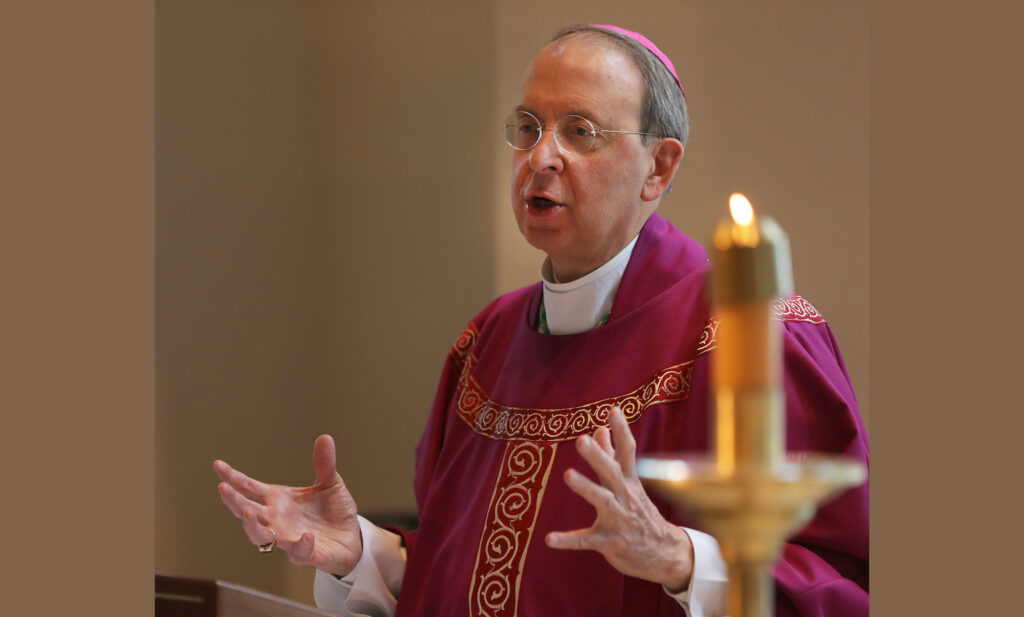BALTIMORE (CNS) — Baltimore Archbishop William E. Lori in a Nov. 10 letter to the Catholic faithful of his archdiocese said the long-awaited Vatican report on former cardinal Theodore E. McCarrick “brings us to another moment of painful awareness of our Church’s past failures.”
But “it also marks a new era of transparency in our Church, which the lay faithful have rightly demanded,” he wrote.
His letter followed the release earlier that day of the “Report on the Holy See’s Institutional Knowledge and Decision-Making Related to Former Cardinal Theodore Edgar McCarrick.”
The 460-page report is the result of a two-year investigation into how McCarrick, although dogged for years by rumors of sexual impropriety, was able to rise up the Catholic hierarchical structure based on personal contacts, protestations of his innocence and a lack of Church officials reporting and investigating accusations, according to the Vatican report on the matter.
“While the contents of the report are painful, I am grateful that this information has finally come fully to light, and especially grateful to the victim-survivors who came forward, to those who persisted in demanding an investigation into their allegations, and to those who took appropriate action to answer those demands,” Archbishop Lori said, adding he was grateful to Pope Francis for initiating the investigation “and for enacting the strongest-possible sanctions against Mr. McCarrick, who was laicized in January of 2019.”
“Recognizing that this report serves as a painful reminder of past harms, I wish most of all to offer again my humble and sincere apologies to anyone who has suffered abuse or harassment by a member of the clergy,” the archbishop said. “As I have in the past, I offer the Church’s pastoral support, as well as the opportunity to meet with me or our other bishops, to any survivor who might find that helpful.”
Acknowledging how much “suffering and anguish” the faithful have endured “due to the worldwide pandemic, economic pressures, civil unrest and the ugly specter of racism, my heart truly aches to think that your Church could be a further occasion of pain and trauma,” he said.
“I pray that your relationship with our savior Jesus Christ, who will never fail us, and his presence in the sacraments, will bring you comfort. I pray too that the Holy Spirit will lead you to a deeper recognition of your own role as a missionary disciple in the Church, and as an agent in helping to guide us to ever greater transparency, accountability and renewal. I welcome your involvement as we continue this work together.”
Like Archbishop Lori, Catholic bishops across the country issued statements in response to the reports release. Here are excerpts from some of those statements:
— Archbishop John C. Wester of Santa Fe, New Mexico: “Pope Francis has committed himself and the Catholic Church to accountability, responsibility and transparency. The McCarrick report is part of this commitment, but by no means the last word. Rather, it marks a critical moment in the life of the Church to accept the truth no matter where it is found and no matter where it leads. Pope Francis’ integrity and the integrity of the Church rests on this fundamental principle. The McCarrick report underscores the importance of hearing and respecting the accounts of those who have been abused.
“It points to the necessity of working together to find the truth, which is the first step in the healing of victims and the healing of the Church. It also unveils the insidiousness of clericalism and the devastating effects of selfish ambition and unbridled power. … I believe that while it sheds a bright light on the sins of the past it, also illumines the path of all bishops and those in authority in the Church as we strive to reflect the light of Christ in all aspects of our lives and ministry. I pray that this report will be an important part of a wider effort on the part of the Catholic Church to build a new moment of trust and truth, ‘… a new heaven and a new earth.’“ (Revelation 21:1)
— Archbishop Allen H. Vigneron of Detroit: “While the document is profoundly difficult to confront, I am encouraged by the Vatican’s commitment to produce and publicly release the information with which we must grapple if we are to continue the path of reconciliation, reform and healing in our Church. The length of time invested in fact-finding and the length of the document itself indicates to me there was no fear in reporting the truth. The truth, as the Lord assures us, ‘… will set us free’ (Jn 8:32). The truth shows us the sure path to purification and reform. The immediate and most important takeaway from this report is to reaffirm our commitment to the care and healing of victim-survivors and to continue the renewal of our efforts to protect children and vulnerable adults.
“There is also a valuable lesson for all Church leaders on our responsibility to ensure this is never allowed to happen again. For this, I am grateful anew for the Catholic Bishop Abuse Reporting Service (CBAR), newly established earlier this year to receive reports of sexual abuse and related misconduct by bishops and to relay those reports to proper authorities for investigation. To those harmed by the actions and inaction of Church leaders, on behalf of our local Church, I am sorry that you were neither protected nor heard. I hold you in prayer especially today, as I read this report and firmly recommit myself and the Archdiocese of Detroit to seeking truth, ensuring safety and facilitating healing.”

